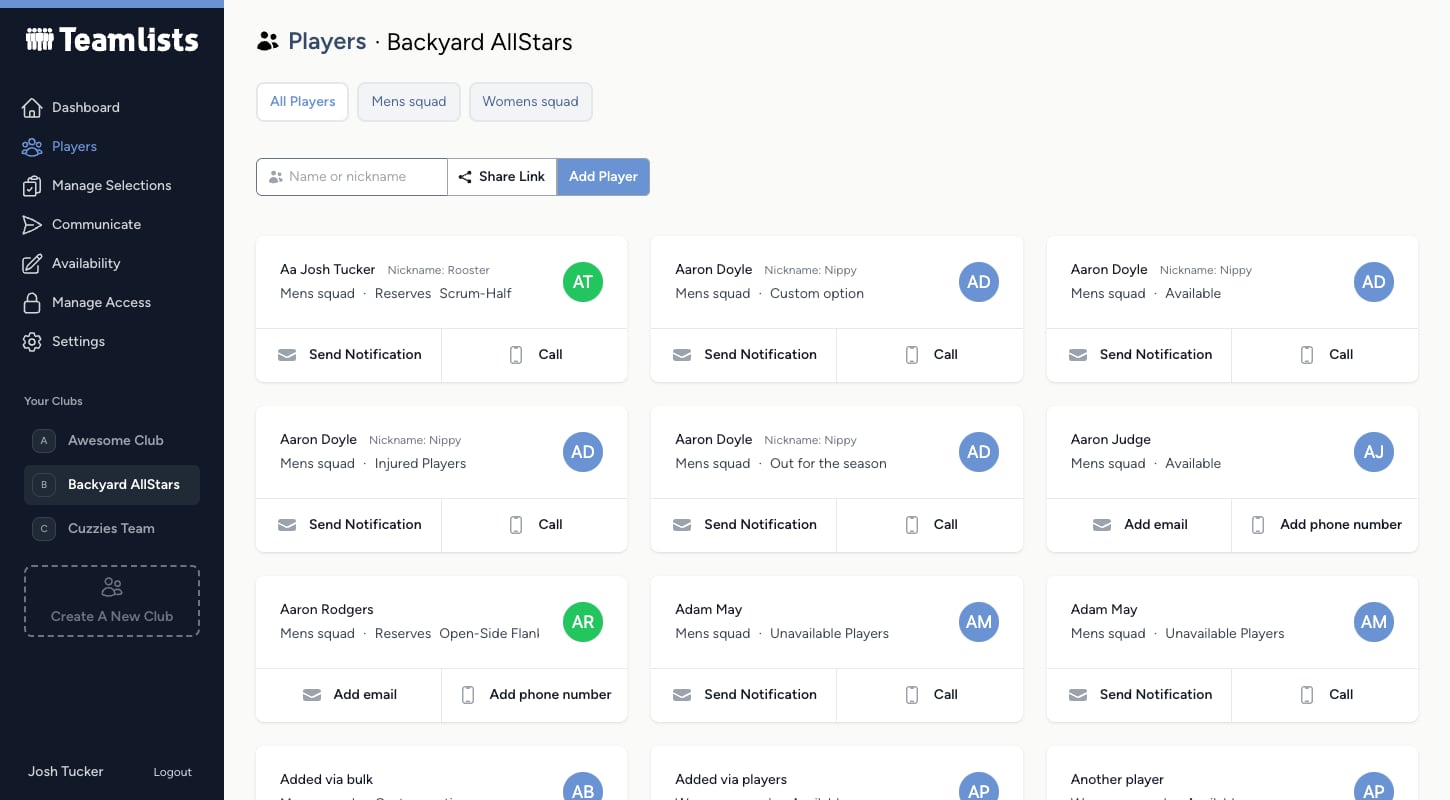Managing a sports team is a challenge that requires balancing various responsibilities—from coordinating schedules to ensuring effective communication among all members. These tasks can become overwhelming, leading to frustration and inefficiencies. However, with the advent of specialised tools like Teamlists, coaches, managers, and team administrators can streamline their operations, allowing them to focus more on coaching and less on administrative hassles.
The Complexity of Team Management
Team management involves orchestrating numerous elements to ensure a cohesive and successful unit. Some common challenges include:
-
Player Information Management: Keeping accurate records of player details such as contact information, and attendance can be cumbersome, especially when relying on outdated methods like spreadsheets.
-
Communication Overload: Managing communications through multiple channels—emails, text messages, and social media—can lead to missed messages and confusion.
-
Scheduling Conflicts: Coordinating practice sessions, games, and events while considering individual availability is a complex puzzle that often results in conflicts and last-minute changes.
-
Team Selection Dilemmas: Deciding on team rosters and positions without a clear overview of player availability and performance can lead to suboptimal decisions.
These challenges not only consume valuable time but also detract from the primary goal of fostering player development and team success.
The Impact of Inefficient Management
Ineffective management practices can have several detrimental effects:
-
Decreased Player Satisfaction: Players may feel undervalued or frustrated if communications are unclear or if scheduling issues persist.
-
Parental Concerns: In youth sports, parents expect timely and accurate information. Failures in communication can lead to dissatisfaction and reduced trust in the coaching staff.
-
Coach Burnout: Coaches overwhelmed by administrative tasks may experience burnout, reducing their effectiveness and passion for the sport.
-
Team Performance: A lack of organisation can lead to missed practices, unprepared players, and ultimately, poor performance in competitions.
Recognising these issues is the first step toward implementing solutions that enhance efficiency and satisfaction for all stakeholders.
Embracing Digital Solutions
The integration of technology into sports management offers a pathway to overcome these challenges. Online sports team management software, such as Teamlists, provides a centralised platform to manage various aspects of team operations.

Centralised Player Management
Teamlists offers an Online Player Directory that allows coaches and admins to access a comprehensive list of players, including contact details, all in one place. This feature eliminates the need for multiple spreadsheets and ensures that information is always up-to-date.
Streamlined Communication
Effective communication is crucial for team cohesion. Teamlists enables targeted messaging, allowing users to select recipients—be it the entire club, specific teams, or individual players—and send notifications via email or push notifications. This ensures that messages are relevant and reach the intended audience promptly.
Efficient Scheduling and Availability Tracking
Coordinating schedules becomes effortless with Teamlists' availability tracking feature. Coaches can add events and collect availability from players through simple forms. The responses are then overlaid on current team selections, aiding in effective planning of sessions or games.
Simplified Team Selection
The platform's Drag-and-Drop Team Selection feature acts as an online whiteboard, allowing coaches to assign players to teams in real-time. This visual approach simplifies decision-making and ensures that all stakeholders are informed of team compositions.
Addressing Common Pain Points
By leveraging the features of Teamlists, several common pain points are effectively addressed:
-
Difficulty Managing Player Information and Communication: The centralised database and targeted messaging system reduce the complexity of managing player information and communication.
-
Frustration from Constant Back-and-Forth Communications: With scheduled communications and clear channels, the endless back-and-forth is minimised, leading to more efficient interactions.
-
The Struggle to Keep the Team Organised: Teamlists embodies the philosophy that organisation and communication should be seamless, allowing coaches to focus on what truly matters—coaching and developing players.
Achieving Successful Outcomes
At Teamlists, we recognise the challenges faced by coaches, managers, and team admins. We understand how overwhelming it can be to keep track of everyone’s details and ensure effective communication. Our platform is designed with empathy, aiming to alleviate these burdens and enhance the overall team management experience. Implementing Teamlists leads to tangible benefits:
-
Enhanced Organisation: All information is centralised and easily accessible, reducing confusion and errors.
-
Improved Engagement: Clear and targeted communication fosters a sense of community and keeps everyone informed and involved.
-
Greater Control: Coaches and admins have a comprehensive overview of all aspects of team management, allowing for proactive decision-making.
-
Responsive Community: With streamlined communication and scheduling, the team community becomes more responsive and cohesive.
Conclusion
Managing a sports team doesn't have to be a struggle. By embracing digital solutions like Teamlists, coaches, managers, and team admins can transform their administrative processes, leading to a more organised, engaged, and successful team environment. The key lies in recognising the challenges and proactively implementing tools that address these issues, ultimately allowing for a focus on what truly matters—developing players and achieving team success.